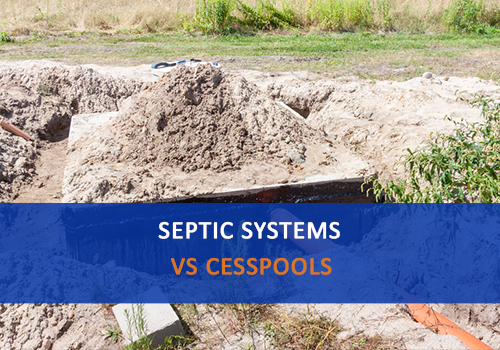The disposal of waste plays a significant role in our communities, both in the past and the present. Where people live, waste also lives. For thousands of years, communities have put systems into place to rid areas of waste, always finding the next best solution. For some in the past, that solution was cesspools.
Cesspools are one of the oldest wastewater removal systems. Dating back to Ancient Rome, cesspools were widely used. With many of the populations using community bathhouses and interconnecting systems, it worked for the Romans.
Some 100s of years later, septic tanks and early septic systems were invented. Today cesspools are almost obsolete. So, what’s the difference between septic systems and cesspools?

What is a Septic Tank?
A septic tank is an underground water-treatment mechanism. These systems treat wastewater derived from indoor plumbing.
From there, your septic tank will digest the solid materials from the wastewater and transfer the remaining liquid (effluent) slowly into the soil.
The flow goes something like this:
- All of the water you consume flows into your septic tank.
- The septic tank holds the waste long enough until all of the solid materials break down. Leaving bacteria to break down the solids while the liquids move on.
- The liquid waste (effluent) leaves the tank and enters the drainfield.
- The drainfield filters the wastewater in the soil, removing the remaining bacteria, nutrients, and viruses.
In today’s world, septic systems are the new cesspools. A cleaner, more efficient way of treating waste from households. But, why are they better? How do septic systems and cesspools operate differently?
What is a Cesspool?
A cesspool is an underground holding tank for wastewater derived from indoor plumbing. Unlike septic systems, cesspools are much simpler mechanisms.
A cesspool typically has perforated rings made out of concrete; each ring has perforated holes allowing the wastewater to drain directly into the soil without any treatment.
The surrounding soil is inundated with wastewater, not giving it adequate time to remove a large amount of bacteria, viruses, and particulates before the water enters the water table.
Doesn’t sound ideal? That’s because it isn’t. With stricter laws governing how wastewater is reintroduced into the soil to protect community health as well as the environment, cesspools are no longer usable waste treatment solutions.
Why Septic Tanks are More Ideal than Cesspools
A septic tank is a comprehensive system that entails the collections, treats, and removes waste. A cesspool only collects and removes waste; there is no treatment involved.
Septic tanks are more ideal because they break down wastewater strategically. Over time, wastewater is slowly introduced into the surrounding soil.
Conversely, wastewater is hastily dumped into the surrounding soil in a cesspool. This can lead to the immediate degradation of this soil, prompting you to relocate the cesspool regularly.
Also, septic tanks can hold sludge for extended periods, unlike cesspools. Cesspools are usually pumped far more regularly than septic systems.
If this doesn’t happen, the sludge can clog the holes in the cesspool, and it will stop working entirely. For this reason, the United States has banned cesspools throughout the country.
They are much too costly to install, and it takes a lot of maintenance to ensure that the mechanism is working properly. Septic tanks are low-maintenance and extensive waste management systems built for modern-day homes and modern-day health laws.
Pump Your Septic Tank Today!
Do you want to learn more about how you can pump your septic system? If so, give us a call at (352) 242-6100 today!

